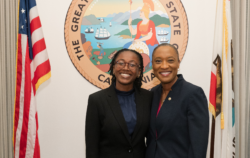
Mount Holyoke Scholar Studies Neuroscience, Social Justice
Maryam Ware, a senior majoring in neuroscience and behavior at Mount Holyoke College, has emerged as a leader in both her academic work and in the community. As she builds experience as a researcher, Maryam has focused on the intersection between neuroscience and social justice, including studying the neural basis of prejudice and discrimination.
As she begins senior year, Maryam has already structured her senior thesis on the creation of a reading intervention for first-grade students in Roxbury, Massachusetts. Her plan is to use rap’s rhythmic predictability to help improve vocabulary acquisition and reading comprehension.
She has demonstrated leadership on campus as founder of the Psychology Association, a new student-run organization. Maryam has worked to create workshops, coordinate guest speakers, and conduct monthly leadership meetings. After first serving as president of the association, she now mentors its newly elected leaders.
Maryam aspires to become a clinical pediatric neuropsychologist, working to assess and diagnose children.
Maryam also works as a Health Justice Fellow at the Muslim Justice League, a Boston-area nonprofit that works to advocate for communities routinely targeted in policing and surveillance practices.
This past summer, Maryam served as a research assistant supervisor, analyzing how using an avatar of a different race in a virtual game environment can increase racial empathy among white participants.
In a second formative summer experience, Maryam is interning as a research assistant for the former mayor of San Juan, Puerto Rico, Carmen Yulin Cruz, who is writing a memoir.
“I am working closely with her to dig up newspaper archives and articles from the Hurricane Maria catastrophe,” Maryan explains. “It really is a blessing, and I am deeply humbled to work alongside her. I have learned so much from her already.”
After she graduates, Maryam aspires to go to medical school to become a clinical pediatric neuropsychologist, working to assess and diagnose children. She aims to focus her work on Black children with reading and learning disabilities.
“Posse helped me a lot,” she says, noting that the program’s community has encouraged her at Mount Holyoke and beyond. “I met so many wonderful people and have grown so much as a person. I would not be the person I am now without Posse.“

